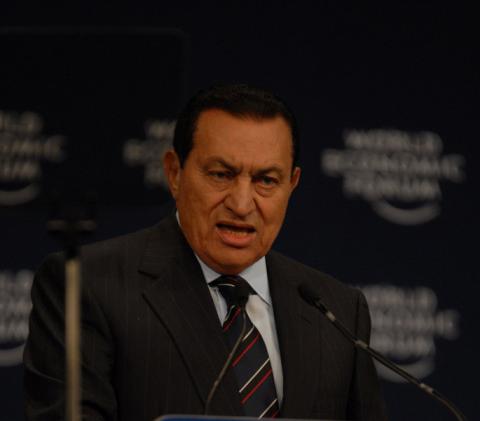A lenient indictment at the Mubarak trial?

The limited charge sheets presented at the trials of Hosni Mubarak and Zine El Abidine Ben Ali may seem at first puzzling, but limiting them in this way serves the useful function of preventing their grandstanding and using their trials to try and defend their regimes, writes Pádraig McAuliffe.
We are familiar, post-Watergate, with the old adage that “It’s not the crime, it’s the cover-up.” As trials proceed in Tunisia and Egypt after the fall of their anciens regimes, the phrase might be bowdlerized to “It's not the human rights violations, it’s the embezzlement” given the eye-brow raising charge sheets.
While Ben Ali and Mubarak presided over authoritarian security states noted for torture and illegal detention, it is notable that their indictments are for the considerably lesser crimes of corruption and giving orders to kill protesters. Mubarak’s trial for corruption and killing protestors constitutes merely the tip of a very large iceberg of criminality. Mubarak and his sons, Gamal and Alaa, appeared in an Egyptian court to face charges. Ben Ali and his wife, Leila Trabelsi, have refused to return from exile in Saudi Arabia. 23 relatives and collaborators of Tunisia’s ousted president are on trial for illegally possessing foreign currency, jewelry trafficking and attempting to flee the country. They face from six months to five years in prison, if convicted. Ben Ali and his wife were tried in absentia recently for his suspected involvement in some of the country’s largest businesses during his 23-year long reign. On 20 June, the couple were sentenced to 35 years in prison after being found guilty of theft and unlawful possession of cash and jewelry. The verdict also includes a penalty of 91 million Tunisian dinars (approximately €50 million) that Ben Ali has to pay. This verdict was dismissed as a “charade” by some Tunisians dissatisfied with the trial.
The relatively paltry nature of the indictments may at first glance appear puzzling given the nature of the regimes and the undoubted zeal for prosecution evinced by the disregard for Mubarak’s alleged illnesses and the Ben Ali sentence (though it should be noted during the furore over the Mubarak trial and Syria’s increased repression, Tunisia quietly released its reviled former justice minister. Said Agreby, a high-profile figure in Tunisia’s old power elite accused of corruption, had fled to Paris without facing trial). Certainly, a degree of selectivity will be required in the trial of any regime figures who mix even a modicum of brutality with longevity. However, it is not without precedent. In the only trials in the former Soviet Bloc of former presidents, namely Ramiz Alia of Albania and Todor Zhivkov in Bulgaria, embezzlement and corruption were the crimes charged and not their use of secret police, concentration camps or ethnic cleansing. Three reasons for this prosecution policy may be advanced. The first is that it is generally popular with the general public – there is a lot of anecdotal evidence to suggest the Chilean public were more interested in trying Augusto Pinochet’s corruption than his human rights abuses proceedings in Europe. It must be pointed out that Tunisians and Egyptians are less complaisant. Secondly, it avoids possible retroactivity issues. While conventional and customary international law have advanced to the point where there is a legal obligation to try torture and (more arguably) crimes against humanity regardless of permissive national laws, the argument based on retroactivity still retains potency as they are usually defended on the basis of powers permitted by law, often emergency statutes. By contrast, trials for corruption and embezzlement will almost always involve the surreptitious breaking of the state’s publicly promulgated laws (See Julian Barnes’ 1992 novel The Porcupine for an excellent satirical treatment of this dilemma).
Finally, and perhaps more pertinently, a trial limited to embezzlement and the recent shooting of protestors offers less scope for the defendants to use the trial to defend their regime overall. By taking the most grubby and morally indefensible of crimes (as opposed to what might be called “system” crimes ostensibly undertaken in the course of “defending” the country from Islamists/Communists/imperialism), the opportunity to turn the trial into an opportunity for grandstanding is greatly reduced. After the Milosevic and Hussein trials, where such grandstanding became commonplace (with receptive domestic audeineces), trials have been used more as a shield against revanchism than a sword that would establish pertinent differences between the regimes, marking a departure from earlier suppositions about the pedagogical effect of trials. With its retrospective character and authority, trials are presumed to highlight, define and condemn past violence while engaging in a moral and psychological reconstruction of identity of the new liberal rule. Contra Durkheim’s view of trial and punishments as a communication of socio-moral outrage and a condemnation of proscribed acts, which at the same time articulates shared moral sentiments which tend to reaffirm a more liberal social identity or solidarity, the opportunity has been eschewed in North Africa. Limited trial, limited truth but limited scope for public defence of the Ben Ali and Mubarak regimes seems the order of the day.
Image top: World Economic Forum.
